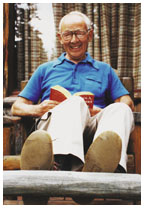|
Web Exclusives: Alumni Spotlight October 5, 2005:
Doctor longevity Henry Mayer ’35’s career in medicine spans 57 years When Henry Mayer ’35 started practicing medicine, freshly discharged after World War II, he made house calls in a decommissioned Navy jeep he bought and painted blue. He carried a heavy bag, like a carpenter’s toolbox, filled with medical instruments. He charged $4 a visit. It was 1948. More than a half-century later, at the age of 91, he is still healing the sick. An internist, Mayer sees patients three times a week at the clinic he helped start several years ago in Redwood City, Calif. Until 2001, he worked full time. Today Mayer splits time with his partner — the same one he’s had since 1954. “I don’t work as hard as I used to. But I still see quite a few patients and I still feel I am useful in the world, so I keep my hand in,” says Mayer, a biology major at Princeton. After more than five decades dealing with ailments from colds to cancer, Mayer says he can usually diagnose someone before he or she has finished describing the symptoms. “Most of medicine is history,” meaning the doctor’s experience, Mayer says. “People come see me and in two minutes I know what’s wrong with them. I don’t tell them I know. I continue to examine them. You have to go through the motions, because otherwise they won’t believe you.” Throughout his career, Mayer often took months off at a time to travel. He spent a year on a round-the-world trip, and he has kayaked remote rivers in New Zealand and climbed mountains with Olive, his wife of 64 years. When he’s not wearing a lab coat, Mayer still enjoys taking long vacations, hiking, and photography. To keep fit, he swims every day. Mayer continues to makes house calls, but only for patients he
has known for years. One of his very first patients comes in for
checkups. She’s 98. “Bright as a dime,” Mayer
says, a description that could as easily apply to the doctor himself.
He plans to keep going as long he remains that way. He says, “I
don’t want to practice if I’ve lost my beans, but I
still have them and I am going to use them.” By Justin Nyberg ’01 Justin Nyberg’01 is a writer for Outside Magazine in Santa Fe, N.M.
|
||

